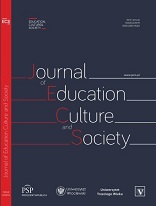Formation of Preschoolers' Communicative Competence in the Conditions of Inclusive Education
Formation of Preschoolers' Communicative Competence in the Conditions of Inclusive Education
Author(s): Olha Turko, Tatiana Olender, Maria Boyko, Olga Petryshyna, Tetiana Rozhko-PavlyshynSubject(s): Social Sciences, Education, Inclusive Education / Inclusion
Published by: Fundacja Pro Scientia Publica
Keywords: communicative competence;corrective work;folklore;inclusive education;language-didactic tools;preschooler;
Summary/Abstract: Aim. The goal of the study is to describe the teacher’s corrective work on pre-schoolers’ sound pronunciation that is developed according to the children’s age, physiological and mental norms, and special educational needs. Methods. Four children with special educational needs participated in this experimental study. We used the method of monitoring children’s speech during various activities: play, household activity and teaching (during speech therapy classes and various types of practical language classes). Results and conclusion. Age-related features of pre-schoolers’ speech development have been identified in the study. The reasons and indicators of pre-schoolers’ speech development disorders have been described, and the ways to overcome language disorders have been found. The experimental study tested the effectiveness of articulation exercises in working with children with special educational needs in an inclusive environment, the involvement of psychologists and children’s parents to overcome speech disorders of pre-schoolers, and the use of folklore texts. Originality. In the experimental study, we observed that riddles, proverbs, ditties, tongue twisters, fairy tales, lullabies, nursery rhymes, counting rhymes, and sayings are an effective means of phonetics and articulation work, during both the speech development classes and other classes as well as during walks.
Journal: The Journal of Education, Culture, and Society
- Issue Year: 13/2022
- Issue No: 1
- Page Range: 239-255
- Page Count: 17
- Language: English

